Is the number of screens better?
Editor’s note: This article comes from WeChat public account “Make Movies Together” (ID: yiqipaidianying) , author: tanks.
This week, the news that a Chinese movie screen was close to 80,000 yuan swept across the entire network.
Near the end of the year, Chinese filmmakers also need data to reach new highs to inspire the hearts of the industry, but Unlike the new record of movie box office / movie visits, the news that the number of screens has reached a new high has received many opinions question.
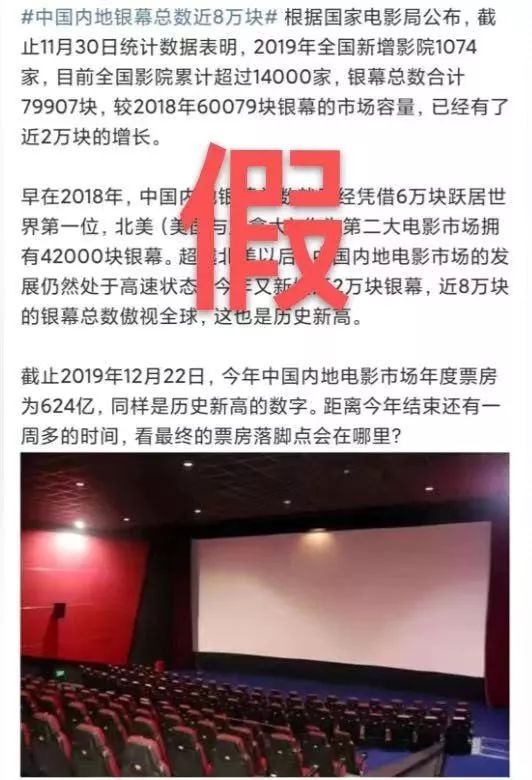
In 2017, China has more than 45,000 screens, officially surpassing the North American market and becoming the world’s largest screen market.
There is no doubt that the increase in the number of screens has made China the world’s largest film market with realistic hardware conditions. But three years have passed. Although the North American box office has fallen by nearly 11% this year compared to the same period last year, the Chinese film market is still not far behind the world’s largest North American market. How many Chinese screens are there? Why do we pursue an increase in screen count? How far is the Chinese film market from the 80,000-block era? We will discuss these issues together today.
How many Chinese screens are there?
The box office and movie visits that are different from the annual market, as well as the single-day box office and the box office of each movie can be queried from third-party platforms such as the special fund office, cat’s eye, and lighthouse. Within 3-5%, it will not affect the results of normal use.
But the number of screens is not clear to ordinary passersby.
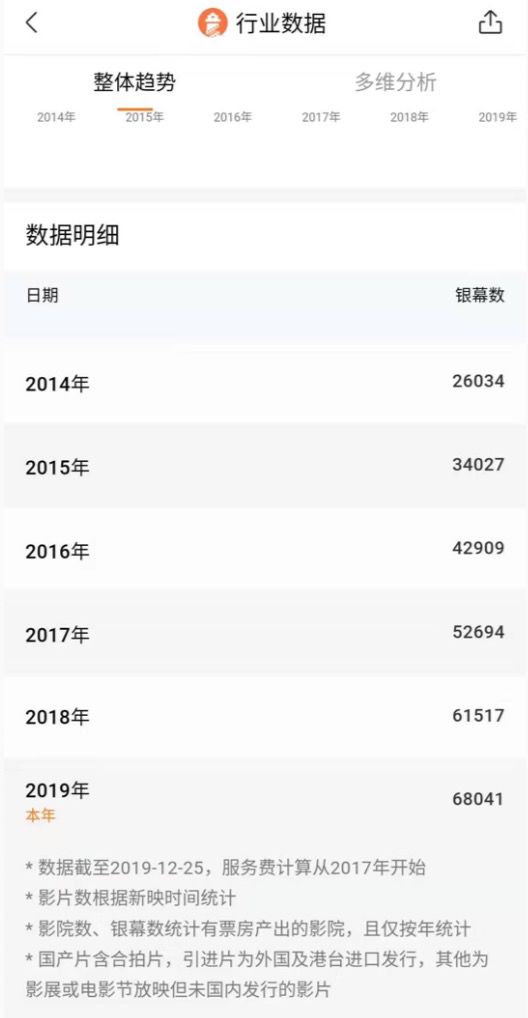
First of all, in the professional version of the Lighthouse, there are industry data such as the number of theaters and screens.According to data, it is still far away. In addition, the two major platforms of Cat’s Eye Professional Edition and Yi En Data also do not have relevant data on the number of screens.
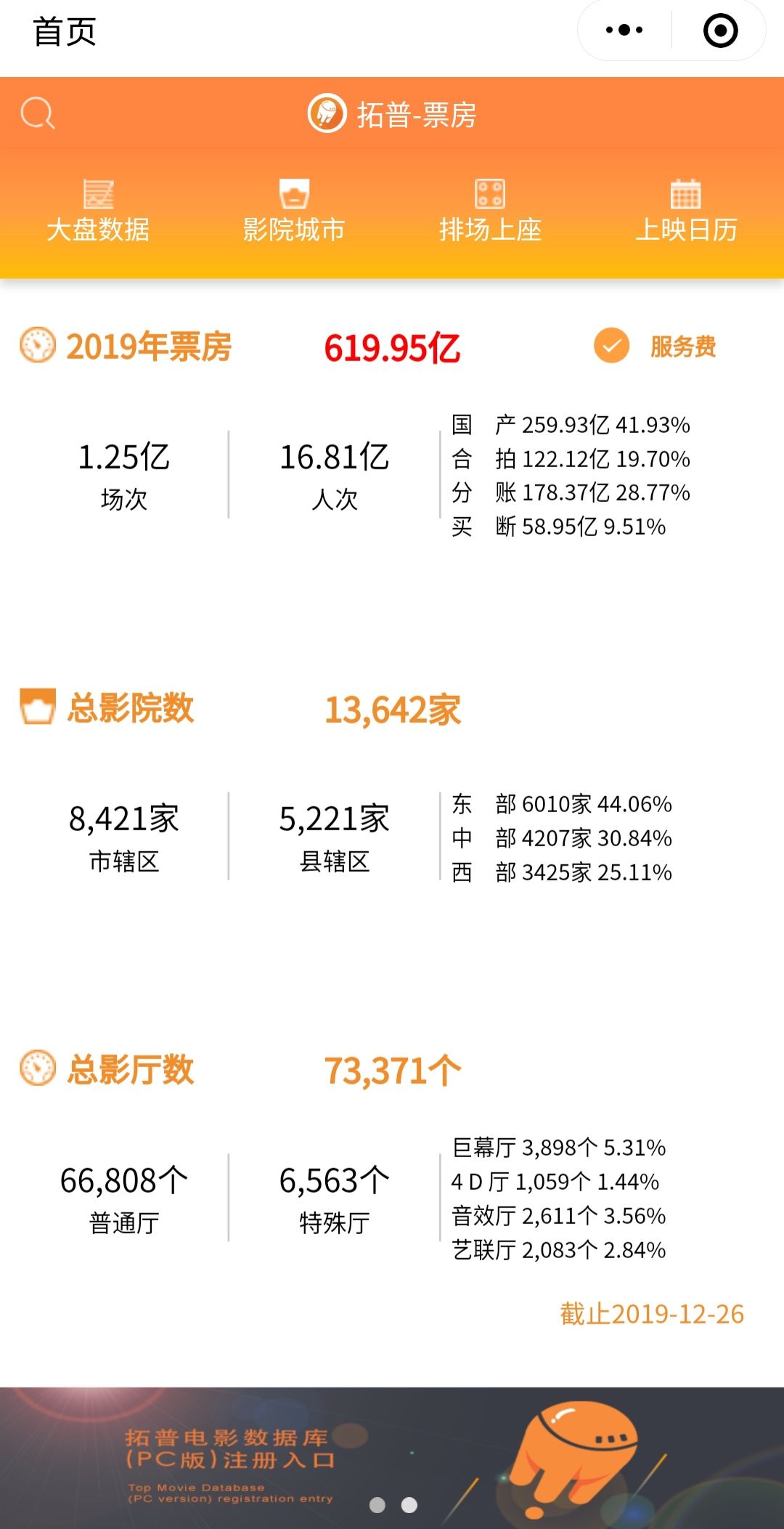
At the same time, we found from the other big data platform-Top Film Database that the latest statistics of the number of screens was 73,371 pieces. Although there is still a big gap between the nearly 80,000 pieces, it is also considered 70,000 pieces. Already. In addition, in addition to the total number of screens, the TOP data also includes statistics of ordinary movie theaters and special effects movie theaters, including the giant screen hall (IMAX + China giant screen?), 4D hall, sound effect hall (Dolby Atmos?), And Art Alliance. Hall data.
But in fact, these all have some gaps with the authoritative official data published by the China Film News. According to the “People’s Daily” yesterday, “Chinese Movies in 2019, A New Chapter in the High Score” article cited the country. According to the data of the Film Special Fund Office, as of December 23, 8,843 new screens were added in 2019, and the total number of screens reached 68,922.
The so-called “screen number reached 79907,” and “it has nearly 20,000 growth throughout the year”, although it wrote the statistics released by the Film Bureau as of November 30, it did not give The way in which the Film Bureau announced the information, under the inspection of many parties, it is very likely that an article from the media when the box office exceeded 60 billion in the middle of this month was suspected of falsifying data.
Why does a simple screen count make such a big difference? According to industry sources, this is because of the number of screens and theaters recorded in the film bureau. The box office statistics are accurate because special funds, taxes, and box office sub-payments are paid at an accurate percentage based on the box office reported by each theater. If the theater does not report accurately, it may still be possible by the end of the year They will face additional warnings and even suspend keys.
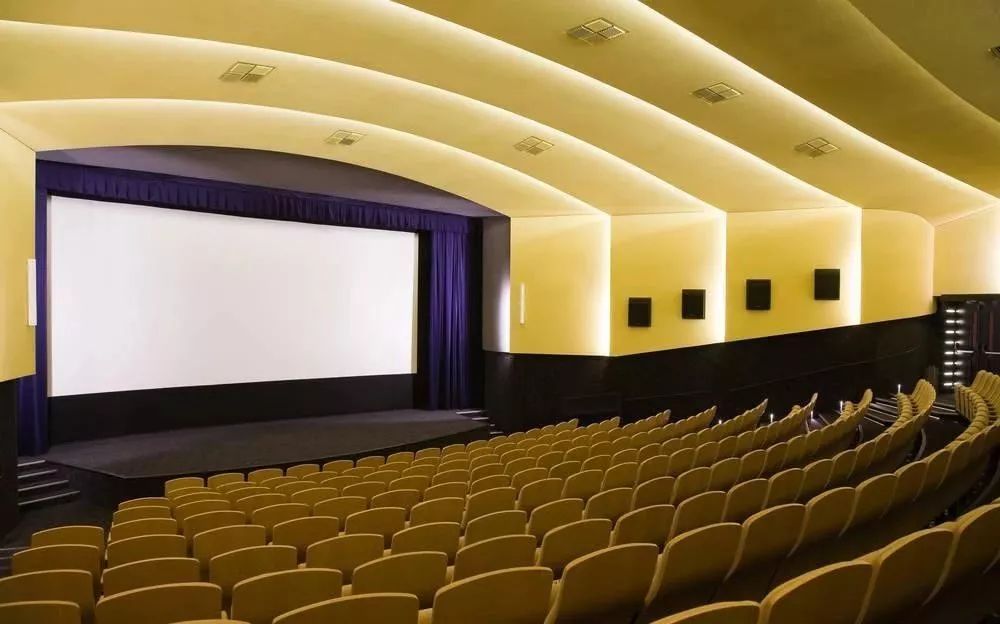
However, for the number of screens and theaters, many closed, relocated and renamed cinemas did not “deregister” the originally reported numbers, which would also lead to statistical gaps between major platforms. Third partyThe basic source of the statistics platform is to capture the number of screens issued by real estate with tickets. Therefore, it is difficult to achieve uniformity with the data of the exclusive office cloth.
Generally speaking, at the beginning of each month, the China Film News will publish accurate statistics for the previous month, including the number of screens. There is no doubt that compared to other platforms, this data counted by the Special Funding Office is the most official screen data. Except for special circumstances, the screen number is announced every single month, and it is not accurate to the real-time screen number.
History of mainland screen evolution
Although the Chinese film market has been undergoing commercial reform since 1994, for the theater, the reform of the theater that originated in June 2002 has completely changed the central, The provincial, city, and county four-level distribution model, , thus also started to enter the stage of stable development in China.
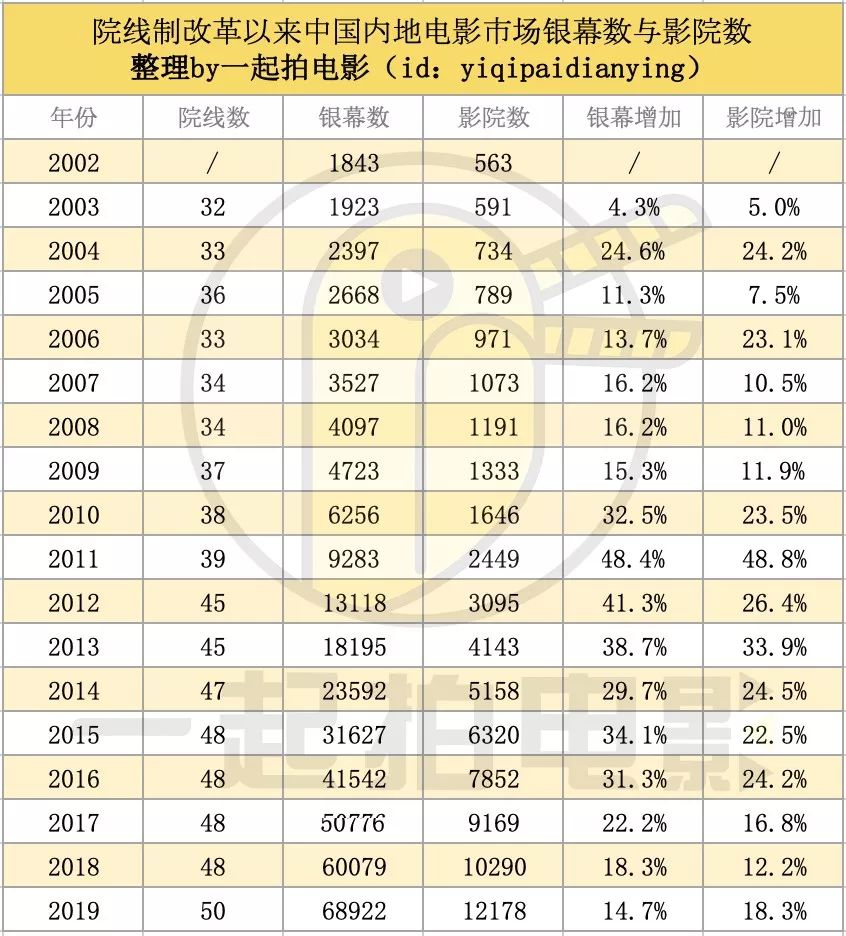
We also counted the number of screens and theaters in the Chinese film market and their growth rates since 2002. It is not difficult to see that from the first few years of 2003-2009, the number of screens in the Chinese film market has basically maintained a slow growth of about 15%, but since 2010, this number has started to soar, and in 2011 it has even reached This is the highest increase in history of 48%, which is also due to the 2010 box office explosion of “Avatar” brought a large-scale innovation to the Chinese screen.
From 2010 to the present, the number of screens in the Mainland has maintained an average increase of 30%, which has basically kept pace with the box office growth. However, judging from the only 14.7% increase this year, this value is also the lowest increase since 2009. It can be said that starting from this year, the number of screens in the Mainland has also reached a stage of basically stable growth. It is predicted that in the long term, the annual screen number increase will be difficult to exceed 20%, and it will even drop to 10 after 3 years %the following.
Although the box office of Chinese movies has entered a slow growth period of about 10% since 2016, why can the number of screens still grow by more than 20%?
There are two main reasons for this, one is the inertia of screen growth . The construction of the theater is a heavy asset project and is synchronized with the construction of the venue. The general construction period is 2 years. Most of the newly opened theaters have been planned for the past two years, and this plan is also accompanied by the construction of large shopping malls and shopping malls.Even if the film market is not in the limelight, it will not change in the short term. This is also an important reason for the rapid growth of the screen in the short term. Looking at the growth of only 14.7% this year, it is obviously affected by the cold winter of the movie market that began two years ago, and the number of screens in the Mainland has entered a bottleneck period of development.
Another important reason is related policy support. This is what we will elaborate next.
Imagining the 80,000 screen age
On December 11, 2018, the National Film Administration issued the “Opinions on Accelerating the Construction of Cinemas to Promote the Prosperity and Development of the Film Market”. The “Opinions” proposed to achieve 80,000 screens by 2020, aiming to optimize the theater layout and solve the current theater The problem of imbalanced development.
Although we all know that the Film Bureau will set a KPI target for each year’s annual box office growth and visitor growth, but the release of a document specifically setting the screen number growth target also shows that the Film Bureau is responsible for the increase in screen number. care.
The rapid growth of screens is also an important cause of distress for cinema managers. The construction of a large number of new cinemas has brought a more obvious diversion for the slow-growing audience. Single screen real estate sales in 2019 also fell further than last year. There is no doubt that setting a hard indicator for the growth of the number of screens, is a challenge for the mainland movie market, especially the projection market, that has reached the “cold winter”.
However, according to the “Opinions”, the main purpose of “substantially increasing the number of screens” is to improve the construction of “inefficient screens” such as “Bianxian Township”. According to the data from the National Film Office at the end of last month, there have been 5602 county-level city cinemas nationwide, with 24,441 county-level cinema screens, accounting for approximately 46% and 36%, respectively. The number is basically such theaters.
It is true that even with the rapid development of the inland movie market, it is expected to catch up with North America in three years, but many central and western counties and remote villages do not have multiple theaters. The policy encourages cinema investors to invest in the construction of cinemas in this part of the region, which is also equivalent to a kind of “poverty alleviation”, but the simple investment of 300,000 yuan subsidy does not necessarily enable the studio to smoothly develop for a long time. In short, That is to say, the opening of the business and the continuous business cannot be controlled. This is also a problem that needs attention and avoidance in the “poverty alleviation” stage.
Nevertheless, with the support of policies, it can be expected that the number of theaters in this area will increase significantly in the coming period. Although the proportion of single-screen box office will be reduced again on the surface, it will have less impact on urban cinemas with more obvious commercial adjustments. At present, it is the general trend that the growth of urban screens returns to rationality.
Cover image from pexels